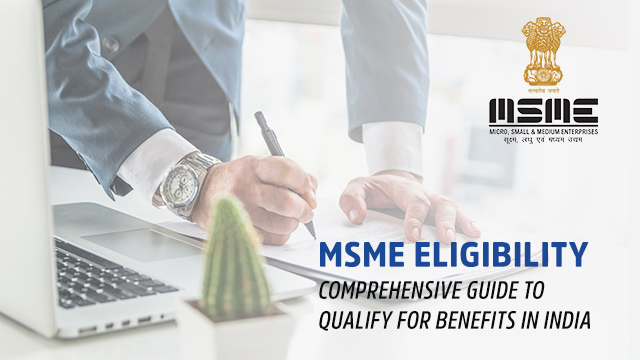As a small and medium business owner, have you ever wondered what can be the key to a world of opportunities? Yes, it is MSME eligibility.
The Indian government has rolled out a range of benefits to empower MSMEs, but not every business can enjoy it. There are some must-meet specific eligibility criteria that you should go through to get registered.
In this guide, you will walk through everything that should be known to you for qualifying for the MSME benefits.
What is MSME?
MSME stands for Micro, Small, and Medium Enterprises, which can be classified as per the investment made in plant and machinery/equipment and annual turnover. Under the MSMED Act, 2006, the MSME sector encompasses only manufacturing and service-based businesses.
However, the recent amendments in 2020 revised the MSME classification to remove any kind of distinction made between manufacturing and service businesses. Instead, a composite criterion was introduced on the basis of both investment and turnover.
The revised classification:
- Micro Enterprises: Investment exceeding ₹1 crore and turnover more than ₹5 crore.
- Small Enterprises: Investment exceeding ₹10 crore and turnover more than ₹50 crore.
- Medium Enterprises: Investment exceeding ₹50 crore and turnover more than ₹250 crore.
Eligibility Criteria for MSME Registration
Do you want to enjoy the benefits that come with the government schemes? Go through the below key requirements and ensure whether you meet eligibility criteria or not.
1) Investment and Turnover Limits
Make sure your enterprise falls within the specified investment and turnover limits:
- Investment in plant and machinery/equipment: In this, only assets are considered that contribute to production or service. It excludes costs like land, furniture, and building.
- Annual turnover: For this calculation, GST-based turnover is used. Also, it excludes the export revenue to encourage global competitiveness.
2) Sector and Nature of Business
Your business comes under the permissible categories for MSMEs, such as manufacturing, service, and trading.
On the other hand, some sectors are excluded, like agriculture and allied activities (except specific cases).
3) Aadhar and PAN
For registration, the Aadhar card of owners is considered mandatory. Also, your business must provide the PAN or Permanent Account Number.
4) GSTIN
GSTIN means Goods and Services Tax Identification Number is not mandatory for MSMEs. Still, it is required for businesses that exceed the turnover thresholds under GST law.
Challenges to Qualify for MSME Eligibility
There might be the case that you face challenges to meet MSME eligibility criteria. Below are some of the common challenges:
1) Inadequate Documentation
Documents like PAN, Aadhar, and GSTIN are crucial for registration. If you lack proper documentation, then you may face delays or rejection in the registration process.
2) Inaccurate Records
Always maintain proper financial records to demonstrate compliance with your investment and turnover thresholds. In case you're struggling with bookkeeping, then you can face eligibility issues.
3) Limited Understanding of GST
Generally, the entrepreneurs get confused about the GST framework and its implications on MSME classification. It is common with those who transition from unorganized to the formal sector.
4) Lack of Awareness
There are many small business owners who are unaware of the eligibility criteria. Such a lack of knowledge can prevent them from leveraging government benefits.
Conclusion
Now, you must have understood the eligibility criteria, and if you're eligible, then you are lucky to enjoy government-provided benefits. So, kickstart your business journey and use the potential to thrive in the competitive market.


